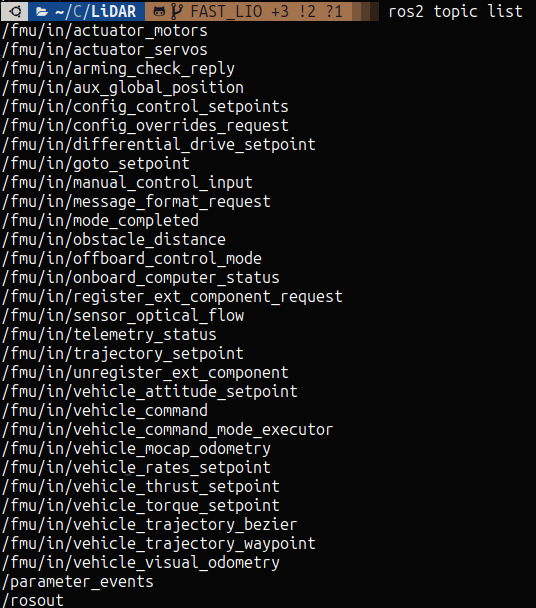Once I arm my PixHawk, I stop receiving messages from all /fmu/out/* topics. All except for /fmu/out/sensor_combined/, which seems to publish at a very slow rate. Note I am using this work around mentioned in #22456 in order to arm since I am unable to get a GPS lock inside my lab.
Here is my code which sets the PixHawk to Offboard Mode and arms:
#include <px4_msgs/msg/offboard_control_mode.hpp>
#include <px4_msgs/msg/vehicle_attitude_setpoint.hpp>
#include <px4_msgs/msg/vehicle_control_mode.hpp>
#include <px4_msgs/msg/vehicle_command.hpp>
#include <rclcpp/rclcpp.hpp>
#include <stdint.h>
#include <chrono>
#include <iostream>
using namespace std::chrono;
using namespace std::chrono_literals;
using namespace px4_msgs::msg;
class Offboard : public rclcpp::Node
{
public:
Offboard() : Node("offboard")
{
//isArmed = false;
qos_profile = rmw_qos_profile_sensor_data; // might break in the future
auto qos = rclcpp::QoS(rclcpp::QoSInitialization(qos_profile.history, 5), qos_profile);
// publisher instantiations
attitude_setpoint_publisher = this->create_publisher<VehicleAttitudeSetpoint>("/fmu/in/vehicle_attitude_setpoint", 10);
offboard_control_mode_publisher = this->create_publisher<OffboardControlMode>("/fmu/in/offboard_control_mode", 10);
vehicle_command_publisher = this->create_publisher<VehicleCommand>("/fmu/in/vehicle_command", 10);
// subscriber instantiations
vehicle_control_mode_subscriber = this->create_subscription<VehicleControlMode>(
"/fmu/out/vehicle_control_mode",
qos,
std::bind(&Offboard::subscribe_control_mode, this, std::placeholders::_1)
);
tick = 0;
auto timer_callback = [this]() -> void
{
if (tick % 10 == 0)
{
RCLCPP_INFO(this->get_logger(), "Tick: %ld", tick);
}
/* We check isArmed first inorder to take advantage of
* short-circuit evaluation. Thereby skipping the
* tick % 10 operation if isArmed is true.
*/
if (!isArmed && tick % 10 == 0)
{
// Change to Offboard mode
this->publish_vehicle_command(VehicleCommand::VEHICLE_CMD_DO_SET_MODE, 1, 6);
// Arm the vehicle
this->arm();
}
// offboard control mode needs to be paired with the specified setpoint
publish_offboard_control_mode();
publish_attitude_setpoint(); // in our case, this is the attitude setpoint
tick++;
};
timer = this->create_wall_timer(100ms, timer_callback);
}
void arm();
void disarm();
private:
// Declarations
// Publishers
rclcpp::Publisher<OffboardControlMode>::SharedPtr offboard_control_mode_publisher;
rclcpp::Publisher<VehicleAttitudeSetpoint>::SharedPtr attitude_setpoint_publisher;
rclcpp::Publisher<VehicleCommand>::SharedPtr vehicle_command_publisher;
// Subscribers
rclcpp::Subscription<VehicleControlMode>::SharedPtr vehicle_control_mode_subscriber;
// Misc
std::atomic<uint64_t> timestamp;
rclcpp::TimerBase::SharedPtr timer;
uint64_t tick;
bool isArmed;
rmw_qos_profile_t qos_profile;
// Methods
void publish_attitude_setpoint();
void publish_offboard_control_mode();
void publish_vehicle_command(uint16_t command, float enabled = 0.0, float mode_id = 0.0);
void subscribe_control_mode(const VehicleControlMode & msg);
};
void Offboard::arm()
{
publish_vehicle_command(VehicleCommand::VEHICLE_CMD_COMPONENT_ARM_DISARM, 1.0);
RCLCPP_INFO(this->get_logger(), "Arm command send");
}
void Offboard::publish_attitude_setpoint()
{
VehicleAttitudeSetpoint msg{};
msg.yaw_sp_move_rate = 0.0;
msg.q_d = {0.0, 0.0, 0.0, 0.0};
msg.thrust_body = {0.0, 0.0, 0.0};
msg.timestamp = this->get_clock()->now().nanoseconds() / 1000;
attitude_setpoint_publisher->publish(msg);
}
void Offboard::publish_offboard_control_mode()
{
OffboardControlMode msg{};
/*
* Boolean message values are listed in their respective heirarchy. For each true value,
* values listed bellow it are irrelevant. For more informations see:
* https://docs.px4.io/main/en/flight_modes/offboard.html#ros-2-messages
*/
msg.position = false;
msg.velocity = false;
msg.acceleration = false;
msg.attitude = true;
msg.body_rate = false;
msg.timestamp = this->get_clock()->now().nanoseconds() / 1000;
offboard_control_mode_publisher->publish(msg);
}
void Offboard::publish_vehicle_command(uint16_t command, float enabled, float mode_id)
{
VehicleCommand msg{};
msg.param1 = enabled;
msg.param2 = mode_id;
msg.command = command;
msg.target_system = 1;
msg.target_component = 1;
msg.source_system = 1;
msg.source_component = 1;
msg.from_external = true;
msg.timestamp = this->get_clock()->now().nanoseconds() / 1000;
vehicle_command_publisher->publish(msg);
}
void Offboard::subscribe_control_mode(const VehicleControlMode & msg)
{
isArmed = msg.flag_armed;
}
int main(int argc, char *argv[])
{
std::cout << "Starting offboard control node..." << std::endl;
setvbuf(stdout, NULL, _IONBF, BUFSIZ);
rclcpp::init(argc, argv);
rclcpp::spin(std::make_shared<Offboard>());
rclcpp::shutdown();
return 0;
}
To Reproduce
- Start MicroXRCEAgent
- Echo /fmu/out/vehicle_control_mode
- Run cpp node above.
Expected behavior
/fmu/out/vehicle_control_mode continues to be published to.
Flight Log
Software Version
Ubuntu 22.04
ROS2 Humble
PixHawk Version: 1.5.4
Flight controller
CUAV x7+
Vehicle type
Rover
How are the different components wired up (including port information)
PixHawk is connected to a companion computer via an RS-232 to UART connector. XRCE DDS is running at a baud rate of 115200 with the command:
sudo MicroXRCEAgent serial -D /dev/ttyS0 -b 115200.
Additional context
I have read that it could be that my baud rate is too low. I have tried to increase the baud rate but the Agent hangs. The highest baud rate I have been able to use is 115200.
I have also read about FastDDS. Should I switch to it instead?
(Note this topic is a copy of the my GitHub issue here)


